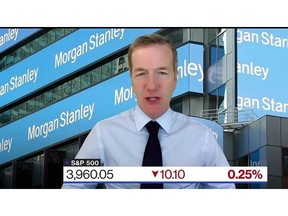Article content
(Bloomberg) — US futures declined along with Asian equities Thursday as Treasury yields continued to edge higher following another round of hawkish comments by Federal Reserve officials.
US futures declined along with Asian equities Thursday as Treasury yields continued to edge higher following another round of hawkish comments by Federal Reserve officials.

(Bloomberg) — US futures declined along with Asian equities Thursday as Treasury yields continued to edge higher following another round of hawkish comments by Federal Reserve officials.
Story continues below
Euro Stoxx 50 contracts were little changed ahead of European inflation data due later in the day.
The rate on benchmark 10-year US government debt consolidated above 4% during Asian trading, weighing on shares from Tokyo to Hong Kong and Mumbai. Hong Kong-listed Chinese technology companies were among the hardest hit, sliding more than 1.5%, after a sharp rally on Wednesday.
Swaps markets are now pricing in a peak US policy rate of 5.5% in September, with some traders betting it may reach 6%. That’s damping appetite for risk taking in markets around the world, even as China offers hope with its economy recovering markedly after Beijing abandoned its Covid-zero policy.
China’s successful reopening is a much-needed bright spot for investors but in terms of inflation “adds cyclical upside pressure because of the sheer amount of demand” that it brings, especially in commodities, Charu Chanana, senior markets strategist at Saxo Capital Markets, said on Bloomberg Television.
Story continues below
Yields on Australian and New Zealand government bonds advanced across the 2-year to 10-year maturities in moves that largely tracked Treasuries in the US session.
The dollar rose against its Group-of-10 counterparts, with the currencies of raw materials and energy exporters like Australia, New Zealand and Norway showing the biggest falls.
The offshore yuan weakened after being one of the most notable gainers versus the dollar Wednesday, when it rallied more than 1% in its largest advance since November.
The trigger for higher yields was Fed officials on Wednesday reinforcing their hawkish stance. Atlanta Fed’s Raphael Bostic called for continued rate hikes to above 5% to make sure inflation doesn’t pick up again. Minneapolis Fed President Neel Kashkari, meanwhile, said he’s concerned that there isn’t much of an indication that the central bank’s rate hikes are slowing down the services sector.
Story continues below
Yield Curve
At above 4% yield, the 10-year Treasury undoubtedly offers a good income although the shorter-end of the curve would be a better investment choice during the current environment. according to Isaac Poole, global chief investment officer of Oreana Financial Services.
He expects further steepening of the yield curve and told Bloomberg Television that this would be “the big trade” over the next 12 months.
Oil was slightly lower after a two-day gain as traders weighed the potential revival in Chinese demand against concerns over tighter US monetary policy. Gold was down marginally after a three-day advance.
Key events this week:
Story continues below
Some of the main moves in markets:
Stocks
Currencies
Cryptocurrencies
Bonds
Commodities
This story was produced with the assistance of Bloomberg Automation.
—With assistance from Rheaa Rao and Tassia Sipahutar.
Comments
Postmedia is committed to maintaining a lively but civil forum for discussion and encourage all readers to share their views on our articles. Comments may take up to an hour for moderation before appearing on the site. We ask you to keep your comments relevant and respectful. We have enabled email notifications—you will now receive an email if you receive a reply to your comment, there is an update to a comment thread you follow or if a user you follow comments. Visit our Community Guidelines for more information and details on how to adjust your email settings.
Join the Conversation